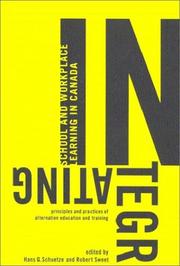| Listing 1 - 10 of 26 | << page >> |
Sort by
|
Book
Year: 2016 Publisher: FrancoAngeli
Abstract | Keywords | Export | Availability | Bookmark
 Loading...
Loading...Choose an application
- Reference Manager
- EndNote
- RefWorks (Direct export to RefWorks)
The first part of the book illustrates the concept of Lifelong Learning ("Educazione Permanente") with special focuses on the transformative learning, the lifedeep learning and the practice of work based learning. The second part of the book opens with an analysis of the concept of Lifelong Learning in the territory of the Alto Adige-Südtirol through the description of operators, organizations, activities and opportunities, regulatory and implementation aspects — and a survey specifically conducted.
Education --- Society & social sciences --- Education --- italy --- operators --- lifedeep learning --- survey --- work based learning --- higher education --- lifelong learning --- transformative learning --- Lifelong learning. --- italy --- operators --- lifedeep learning --- survey --- work based learning --- higher education --- lifelong learning --- transformative learning
Periodical
ISSN: 11752882
Abstract | Keywords | Export | Availability | Bookmark
 Loading...
Loading...Choose an application
- Reference Manager
- EndNote
- RefWorks (Direct export to RefWorks)
Education, Cooperative --- Education, Cooperative. --- Asia. --- Pacific Area. --- cooperative education --- work-based learning --- work-integrated learning --- internships --- work placements
Book
Year: 2016 Publisher: FrancoAngeli
Abstract | Keywords | Export | Availability | Bookmark
 Loading...
Loading...Choose an application
- Reference Manager
- EndNote
- RefWorks (Direct export to RefWorks)
The first part of the book illustrates the concept of Lifelong Learning ("Educazione Permanente") with special focuses on the transformative learning, the lifedeep learning and the practice of work based learning. The second part of the book opens with an analysis of the concept of Lifelong Learning in the territory of the Alto Adige-Südtirol through the description of operators, organizations, activities and opportunities, regulatory and implementation aspects — and a survey specifically conducted.
Education --- Society & social sciences --- Lifelong learning. --- italy --- operators --- lifedeep learning --- survey --- work based learning --- higher education --- lifelong learning --- transformative learning
Book
Year: 2016 Publisher: FrancoAngeli
Abstract | Keywords | Export | Availability | Bookmark
 Loading...
Loading...Choose an application
- Reference Manager
- EndNote
- RefWorks (Direct export to RefWorks)
The first part of the book illustrates the concept of Lifelong Learning ("Educazione Permanente") with special focuses on the transformative learning, the lifedeep learning and the practice of work based learning. The second part of the book opens with an analysis of the concept of Lifelong Learning in the territory of the Alto Adige-Südtirol through the description of operators, organizations, activities and opportunities, regulatory and implementation aspects — and a survey specifically conducted.
Education --- Lifelong learning. --- italy --- operators --- lifedeep learning --- survey --- work based learning --- higher education --- lifelong learning --- transformative learning
Book
Year: 2018 Publisher: Washington, D.C. : The World Bank,
Abstract | Keywords | Export | Availability | Bookmark
 Loading...
Loading...Choose an application
- Reference Manager
- EndNote
- RefWorks (Direct export to RefWorks)
The potential for work-based learning to improve the quality and relevance of vocational education and training is widely recognized. Work-based learning allows students to develop skills and gain experience through practical, real-life experiences in the workplace, complementing what is being learned in the classroom. However, many vocational education and training systems worldwide are still largely school-based and do not incorporate much work-based learning. There are many studies of mature training systems that are already largely employer-driven and firm-based, but less is known about how school-based vocational education and training systems can best transition to including stronger elements of work-based learning. This report takes a region of Poland as a case study to explore the complexities around strengthening work-based learning opportunities as a part of vocational education and training programs. The report focuses on the practical challenges faced by employers and schools in implementing workplace training opportunities and it also draws on international practices for addressing specific constraints. The report highlights that while a conducive policy framework is important, it is not sufficient on its own to improve the incidence, duration, and relevance of work-based learning. Efforts to strengthen work-based learning need to consider the capacity of both firms and training providers, their incentives to take part, and the support they need for their ongoing participation. International practices show that even in vocational education and training systems, where firm-based learning is part and parcel of training provision, significant resources are structurally allocated to support mechanisms to facilitate the process. This report thus recommends investing sufficiently in support mechanisms to firms and schools to facilitate the transition to increased and improved work-based learning. Specific recommendations for Poland's Swietokrzyskie region include piloting different approaches to implementing and facilitating work-based learning. Lessons learned should be incorporated in a subsequent roll-out. The findings and recommendations in this report were developed as part of World Bank assistance provided to Poland's Swietokrzyskie region under the European Union-financed Catching-Up Regions Programme. The analytical framework applied in this report, the findings, and the recommendations will provide knowledge and guidance for stakeholders and practitioners in this field globally.
Apprenticeship --- Demand-Driven VET --- Demand-Responsive --- Employer Engagement --- In-Firm Training --- Labor Market --- Private Sector --- VET --- VET Reform --- Vocational Education And Training --- Work-Based Learning
Periodical
ISSN: 25381032
Abstract | Keywords | Export | Availability | Bookmark
 Loading...
Loading...Choose an application
- Reference Manager
- EndNote
- RefWorks (Direct export to RefWorks)
internships --- work placements --- work-based learning --- work-integrated learning --- cooperative education --- Education, Cooperative --- Social sciences --- Social sciences. --- Education, Cooperative. --- Cooperative education --- Day release (Great Britain) --- Study-work plan --- Work-based learning --- Work experience --- Work-study plan --- Apprentices --- Vocational education --- College students --- Fieldwork (Educational method) --- School-to-work transition --- Behavioral sciences --- Human sciences --- Sciences, Social --- Social science --- Social studies --- Civilization --- Employment --- Enseignement en alternance --- Sciences sociales
Periodical
Abstract | Keywords | Export | Availability | Bookmark
 Loading...
Loading...Choose an application
- Reference Manager
- EndNote
- RefWorks (Direct export to RefWorks)
TVET Asia --- vocational education --- technical training --- work-based learning --- Technical education --- Technical education teachers --- Vocational education --- Vocational teachers --- Study and teaching --- Training of --- Vocational education teachers --- Vocational school teachers --- Teachers --- Education, Vocational --- Vocational training --- Work experience --- Education --- Education, Technical --- Professional education --- Training of. --- Study and teaching. --- Asia. --- Teacher training --- Asian and Pacific Council countries --- Eastern Hemisphere --- Eurasia --- tvet asia
Book
ISBN: 2760517071 1435689569 9781435689565 9782760517073 9782760511699 2760511693 Year: 2002 Publisher: Sainte-Foy (Québec,Canada) : Presses de l'Université du Québec,
Abstract | Keywords | Export | Availability | Bookmark
 Loading...
Loading...Choose an application
- Reference Manager
- EndNote
- RefWorks (Direct export to RefWorks)
Cet ouvrage intéressera autant les enseignants que les chercheurs, les professionnels et les décideurs soucieux de connaître et de comprendre pourquoi et comment se mettent en place différents dispositifs de formation en alternance dans plusieurs pays.
Professional education --- Education, Cooperative --- Cooperative education --- Day release (Great Britain) --- Study-work plan --- Work-based learning --- Work experience --- Work-study plan --- Apprentices --- Vocational education --- College students --- Fieldwork (Educational method) --- School-to-work transition --- Education, Professional --- Career education --- Education, Higher --- Technical education --- Employment --- Enseignement en alternance

ISBN: 1283530007 9786613842459 0773570683 9780773570689 0773524533 9780773524538 Year: 2003 Publisher: Montreal, Que.
Abstract | Keywords | Export | Availability | Bookmark
 Loading...
Loading...Choose an application
- Reference Manager
- EndNote
- RefWorks (Direct export to RefWorks)
Contributors include Lesley Andres (University of British Columbia), Paul Anisef (York University), Paul Axelrod (York University), Laurier Caron (Université de Montréal), Nancy Émond (Université de Laval), Paul Gallagher (Gallagher and Associates), Garnet Grosjean (University of British Columbia), Marcelle Hardy (Université de Québec à Montréal), Walter Heinz (Bremen University), Ann Kitching (Gallagher and Associates), Zeng Lin (Illinois State University), Carmen Parent (Université de Québec a Montréal), Christian Payeur (Université de Laval), Tom Puk (Lakehead University), Hans G. Schuetze, Andrew Sharpe (Centre for the Study of Living Standards), Harry Smaller (York University), and Robert Sweet.
School-to-work transition --- Education, Cooperative --- Occupational training --- Cooperative education --- Day release (Great Britain) --- Study-work plan --- Work-based learning --- Work experience --- Work-study plan --- Apprentices --- Vocational education --- College students --- Fieldwork (Educational method) --- School-to-careers programs --- School-to-work programs --- Transition, School-to-work --- Career education --- Employment

ISBN: 1280143215 1135942366 0203463951 0415945666 9780203463956 9780415945653 0415945658 9780415945660 9781135942366 9781135942311 1135942315 9781135942359 1135942358 9781280143212 0415945658 1901285731 Year: 2004 Publisher: New York London Routledge
Abstract | Keywords | Export | Availability | Bookmark
 Loading...
Loading...Choose an application
- Reference Manager
- EndNote
- RefWorks (Direct export to RefWorks)
Based on five years of research in high school and community college programs, this book explores the potential for using work-based learning as part of a broad education reform strategy.
Education, Cooperative. --- Education. --- Children --- Education, Primitive --- Education of children --- Human resource development --- Instruction --- Pedagogy --- Schooling --- Students --- Youth --- Civilization --- Learning and scholarship --- Mental discipline --- Schools --- Teaching --- Training --- Cooperative education --- Day release (Great Britain) --- Study-work plan --- Work-based learning --- Work experience --- Work-study plan --- Apprentices --- Vocational education --- College students --- Fieldwork (Educational method) --- School-to-work transition --- Education --- Employment
| Listing 1 - 10 of 26 | << page >> |
Sort by
|

 Search
Search Feedback
Feedback About UniCat
About UniCat  Help
Help News
News